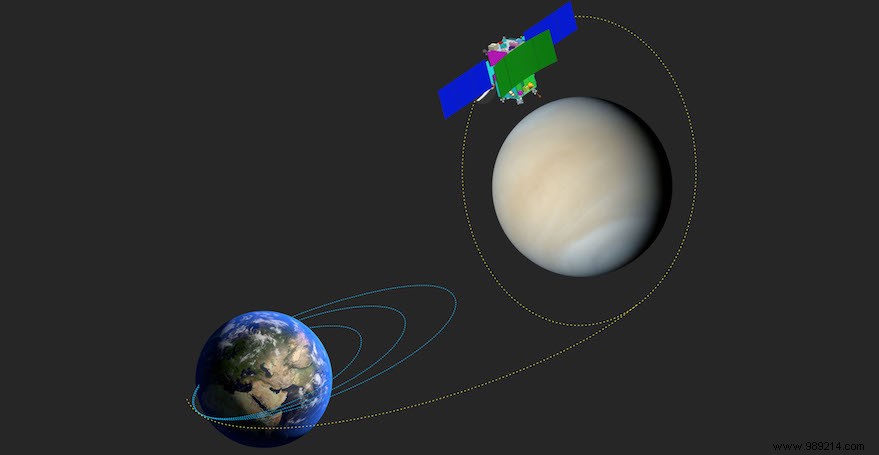India will finally launch its Shukrayaan mission to Venus in 2024 after facing delays due to the pandemic. France will also participate by taking an instrument on board.
Venus is not a good planet to live on. This world could even be, for us poor humans, the worst place in the Solar System. And for good reason, the average surface temperatures are around 462°C and the surface pressure is 90 times that of the Earth at sea level. However, this environment was not always so harsh. Previous studies indeed suggest that the planet was once Earth-like. It was perhaps even habitable, and why not inhabited?
This is the reason why many agencies have continued to keep an eye on Venus for a few years despite its dire conditions. We are thinking in particular of Japan, already there, or of NASA, which is also showing interest. Nevertheless, there are others. Recently, researchers from the Indian space agency (ISRO) indeed transmitted to the government plans to set up a mission to the planet.
Initially, this mission was planned to launch in 2023. However, the pandemic has prompted ISRO to revise its plans. Until recently, this mission was to be launched in 2025. Finally, it should be able to leave Earth a year earlier, as early as 2024 according to SpaceNews .
This mission will be the first on Venus for India. On this occasion, the Shukrayaan orbiter will be capped above an Indian GSLV Mk II rocket.
Once there, several instruments on board will aim to study the planet for four years . One of them, a synthetic aperture radar, will aim to "pierce" the clouds of Venus in order to probe its surface. We could then learn more about its volcanic activity or even evaluate the behavior of matter in the subsoil.
Another instrument developed in collaboration with Sweden, the Venusian Neutrals Analyzer, will examine how charged particles from the sun interact with the planet's atmosphere.

Shukrayaan will also bring in his luggage an instrument for probing the planet's atmosphere in infrared, ultraviolet, and sub-millimeter wavelengths. As a reminder, a few months ago, scientists announced a possible detection of phosphine (an element favorable to life) in the atmosphere of Venus, although these results have since been disputed. However, this Indian instrument could tell us more about it.
Finally, France, India's first strategic partner in Europe, will also participate in this great adventure, expanding decades-old cooperation in the space sector. The French space agency (CNES) will indeed embark its Venus Infrared Atmospheric Gases Linker (VIRAL) co-developed with the Russian Federal Space Agency Roscosmos.